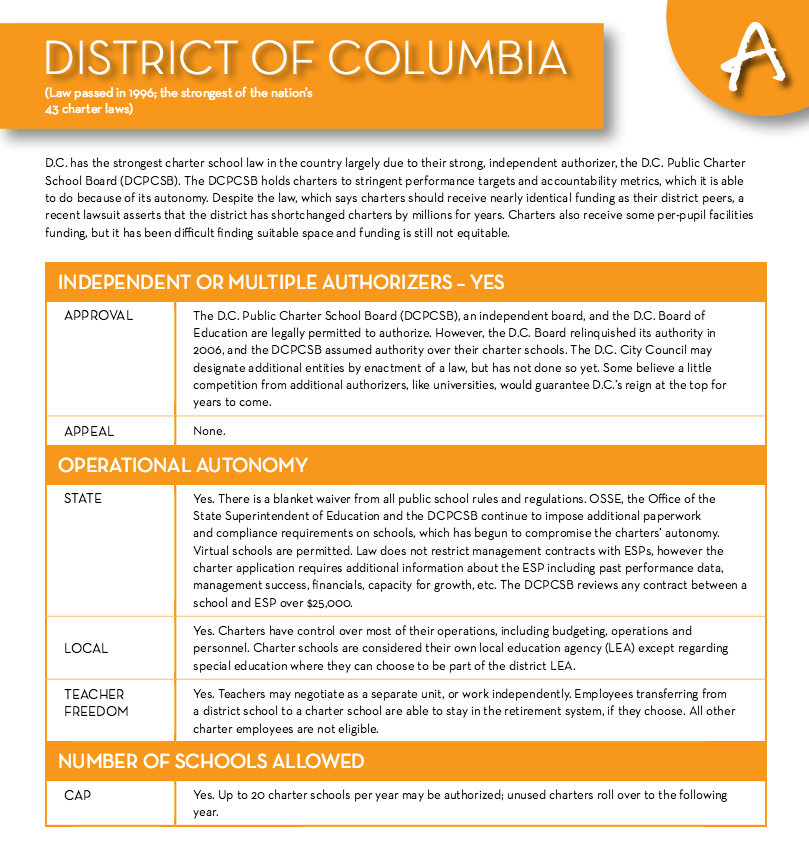Vol. 18, No. 10
DC IS NUMBER ONE. For the past 20 years the Center’s Charter School Laws Across The States Ranking & Scorecard has employed proven analysis to rank the nation’s charter school laws by whether and how they do what they set out to — create the conditions for massive opportunities for students and fam ilies to choose among diverse schooling options. DC has been number 1 and we are pleased that this year, our colleagues at the National Alliance have similarly recognized the superiority of a law which has a highly independent authorizer that is not micromanaged by state and local education agencies (though they try), provides for a high number of charters to open, funds its schools at over 95% plus facilities support, and as a result has transformed a city. This should be the model…
ilies to choose among diverse schooling options. DC has been number 1 and we are pleased that this year, our colleagues at the National Alliance have similarly recognized the superiority of a law which has a highly independent authorizer that is not micromanaged by state and local education agencies (though they try), provides for a high number of charters to open, funds its schools at over 95% plus facilities support, and as a result has transformed a city. This should be the model…
While DC has a charter board, it is not a commission in the vein that other states are pondering. Speaking of which…
KENTUCKY & CHARTERS. Kentucky moves a step closer to having charter schools with lawmakers in both the House and Senate submitting bills. Legislation filed allows for a charter pilot program with only two schools allowed per year in two counties, Jefferson and Fayette. It also creates a charter school commission to approve and oversee schools. The Bluegrass State has tried for a charter law numerous times, so while it is good news that Kentucky is this much closer to charter schools, putting a law in place that mimics some of the nation’s best charter school laws would have the potential to do more for more children.
MAKING SCHOLARSHIPS AS IMPACTFUL AS CHARTERS. The DC Opportunity Scholarship Program has been helping very low-income students for over a decade, with outstanding results. So why wouldn’t John B. King, Jr., Education Secretary nominee, be in support of using $35 million in carry-over funds to help 4,000 more students access an education that will set them up for success? That’s what Senator Tim Scott pondered at King’s hearing two weeks ago. King’s second hearing regarding his Education Secretary nomination takes place tomorrow, March 9.
DC Opportunity Scholarship Program has been helping very low-income students for over a decade, with outstanding results. So why wouldn’t John B. King, Jr., Education Secretary nominee, be in support of using $35 million in carry-over funds to help 4,000 more students access an education that will set them up for success? That’s what Senator Tim Scott pondered at King’s hearing two weeks ago. King’s second hearing regarding his Education Secretary nomination takes place tomorrow, March 9.
UNION’S MISPLACED AGENDA. Hillary Clinton, backed by both the AFT and NEA, danced around Anderson Cooper’s question during Sunday’s Democratic debate about whether unions protect bad teachers. She said “a lot of people have been blaming and scapegoating teachers because they don’t want to put money into the school system.” When you take away the spin from the status quo however, 67 percent of teachers are interested in workforce reforms according to AAE’s latest survey. Union endorsements explain Hil’s backflip on charter schools, which she alternatively supported in 1998, saying charter schools were a good way of “bringing teachers, parents and communities together.” One of the union’s latest misguided attacks on charter schools is in Michigan, where AFT President Randi Weingarten is blaming the alternative public schools for Detroit’s financial and academic woes.
At SXSW? Is innovation, freedom, flexibility and opportunity at the heart of the hundreds of panels and discussions going on? If not, now’s your chance to redirect the SXSW agenda to capture the critical intersection of ed tech in ed reform. Without looser school boundaries and rules, education innovation cannot thrive. Without consumer choice, there’s ultimately no buy-in. To read up on or refresh your mind on what it’s all about, read Ted Kolderie’s book The Split Screen Strategy: How to Turn Education Into a Self-Improving System.
COMING SOON. Time for a reboot – CER introduces EDREFORM TEN-POINT-O. Because every effort we undertake for kids must start at 10.

